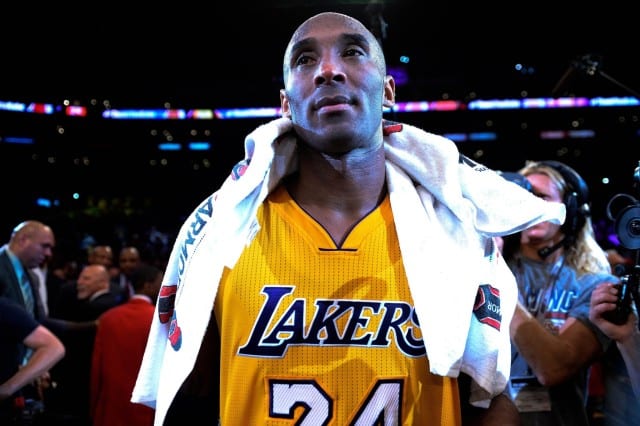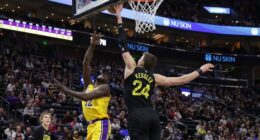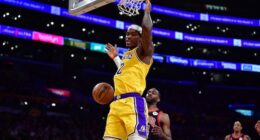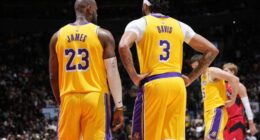Collectively, the NBA has never put more value on bigs capable of stepping out into space and hitting jump shots, whether as a pick-and-pop threat or a Ryan Anderson-esque 3-point shooting floor-stretcher. They simultaneously put pressure on defenses while opening up lanes to the rim. So while “stretch four” has a buzzy trendiness to it — try using the term at your next dinner party — as analytics continue changing perceptions about the most efficient ways to score, he (along with his cousin, the “stretch five”) is a player GM’s and coaches around the league covet. This is not a passing fad.
Ed Davis has exactly none of those qualities.
Heading into Wednesday’s game against the Clippers of the 189 shots Davis has attempted this season, 156 have been inside five feet, according to NBA.com. All but 11 have been inside eight. He’s ventured outside the paint to shoot a grand total of four times. In 86 percent of his shot opportunities, the ball gets in and out of his hands in under two seconds. 71 percent of his shots come without a dribble. Only four percent come after more than two. If he’s rolling to the bucket, Davis tries to finish. If he’s posting up, he’ll make one quick move and shoot.

Davis’s offensive lane might be narrow, but if there are players in the NBA more adept at accentuating strengths while avoiding weaknesses, there aren’t many. “I think Ed does exactly what he’s good at,” Byron Scott says. “He knows exactly who he is. He doesn’t try to shoot 15 foot jump shots, he just tries to get to that basket, get around it, and try to finish.”
Stacking skills upon skills is never a bad thing. Do it enough times and you eventually get Kevin Durant or LeBron James. But you only need to see the rut Jordan Hill fell into after falling a little too deeply in love with his 17-footer to understand the potential downside in offensive expansion. Hill can hit that shot, but not nearly consistently enough to justify the amount of time he now spends taking it. What should be a tool Hill uses to keep defenses honest, enhancing the strengths of his game, has since a hot start become an anchor on his overall production.
— Have You Seen These LIMITED EDITION “Bleed Purple and Gold” T-Shirts? —
Just because you can doesn’t mean you should (and that’s assuming you really can). There’s a discipline in resisting the temptation to “show more,” and adhering to it can be profitable.
“When you have limitations and you understand your limitations and you stay within yourself,” Bryant said of Davis, “you can be great. You know what you can do, you know what you can’t do.”

“What’s crazy is I’ve been taking jump shots throughout my career, but this year I’ve been more focusing on rolling to the basket and finishing at the rim,” Davis says. “If you look at the numbers, (mid-range jumpers) are low percentage shots and if you’re not hitting them, you’re in for a long night as an offensive player. I’m not going to have too many off nights because I’m taking high percentage shots every game by rolling to the rim.”
He’s internalizing the same analytical data, but moving in the other direction (literally and figuratively) to grow more efficient. And while the timing of Davis’s change might seem counterintuitive given how jumpers can get bigs paid, he believes his approach takes advantage of the times.
“A lot of guys now are just popping and defenses don’t know how to play the roll. I score most of my points just off easy buckets, just rolling to the rim,” Davis says.

“I think it will hurt my value for a team that’s looking for a stretch four, but a team that’s looking for a roller to the rim? A guy like me, every team has one, every team needs one,” he says.
Should they be inclined, keeping Davis will require a genuine investment from the Lakers in dollars and years, one by definition eating into the space they’re otherwise reserving for more premier free agents this summer and next. They ought to consider it. Davis is already good, and young enough to improve. Even if he caps out as a guy best used for 25 minutes a night, Davis has the potential to be a solid member of a high quality rotation. That has value. Rosters are built from the top down, but also the bottom up.
That said, given the current front office emphasis on home run hitting, I have no idea if it’s money the Lakers will spend.
If they do, though, they’ll have the comfort of knowing exactly what they’re paying for.
[divide]Kobe Bryant Praises Ed Davis, ‘His Activity Is Phenomenal’







